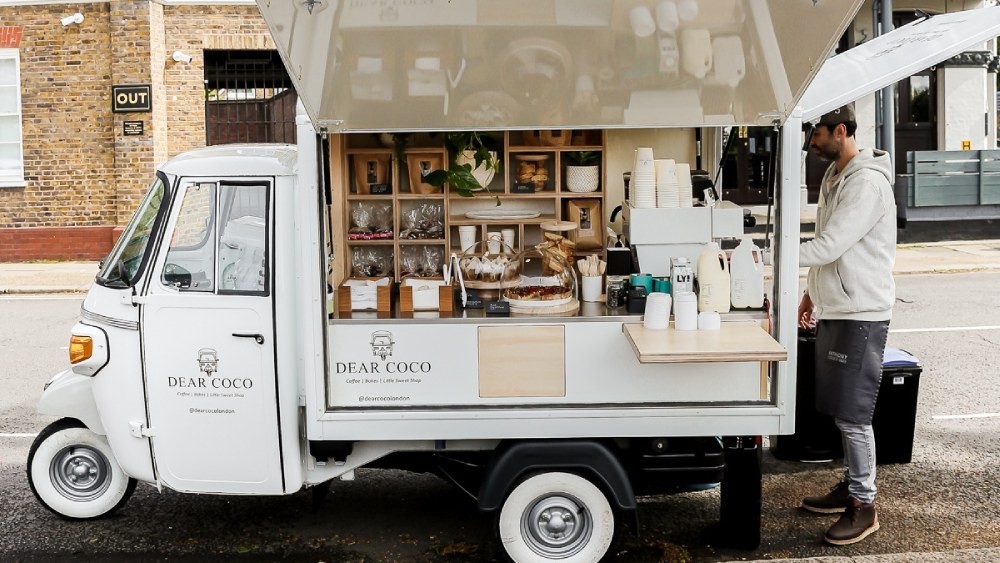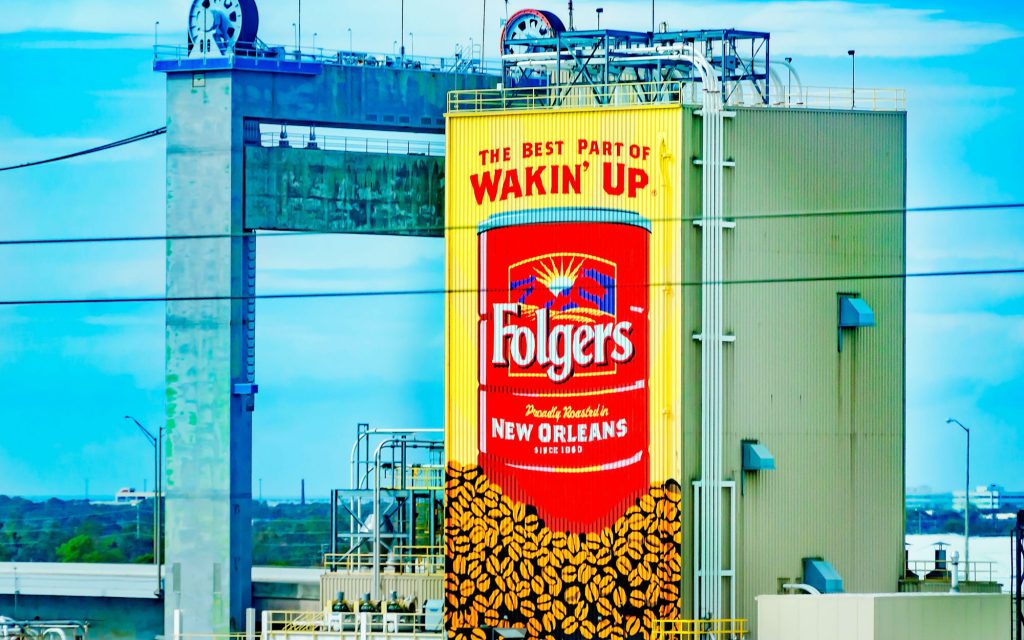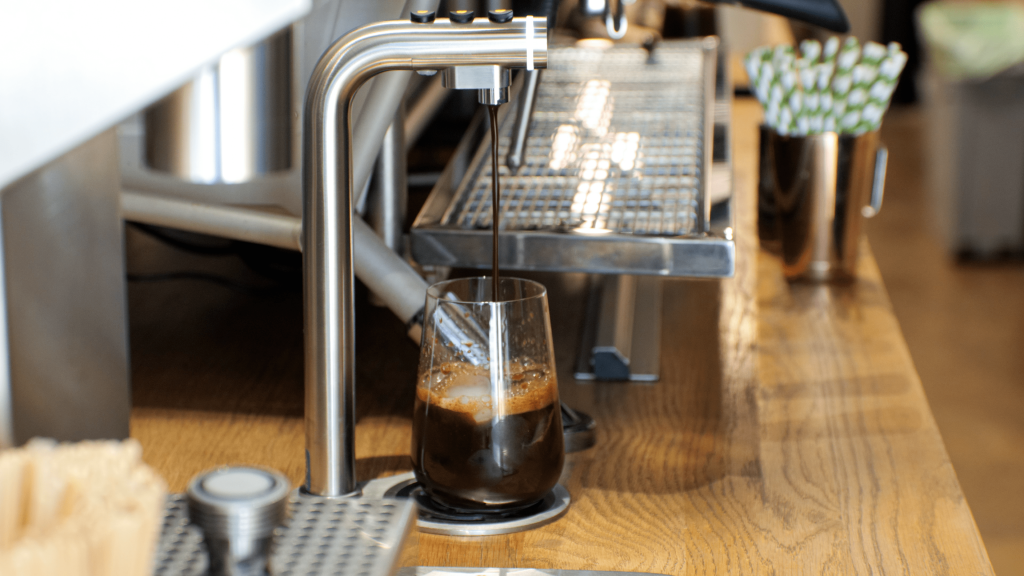Can coffee trucks be profitable for operators?

When we think of coffee shops, brick and mortar cafés usually spring to mind first. These businesses have a physical presence in buildings, and therefore always operate from the same location.
There are, however, an increasing number of mobile coffee businesses in the industry – including coffee trucks. These businesses allow operators to move around and cater to a wider range of customers and events. Additionally, coffee trucks can allow business owners to enter the market more affordably, with less upfront investment required.
So how does one start a coffee truck business? And can they ever be fully profitable?
To learn more, I spoke to Howard Gill, Head of Sales at Grind, and Anthony Duckworth, owner of Dear Coco Street Coffee. Read on to find out what they had to say.
You may also like our article on the growth of drive-thru coffee.
What are coffee trucks?
The wider food and beverage industry is no stranger to mobile businesses. In the US and across Europe, modern food and catering trucks have been popular since the early 2010s – especially following the 2008 economic recession.
But in fact, what we often refer to as “street food” – where vendors sell food and beverages on a street or other public places – has long been popular in many parts of the world such as Asia, Africa, Latin America, and the Caribbean.
Coffee trucks, however, are a relatively new business model in comparison. Although they are very similar to food trucks, they are usually much smaller as they only have to accommodate an espresso machine, a grinder, and other small pieces of equipment, rather than a small commercial kitchen.
As with any mobile food and beverage business, coffee trucks are available in a variety of sizes – ranging from trailers to vans to kiosks, or even bikes. Operators and owners can choose to customise their own setups, or buy pre-outfitted mobile coffee businesses.
To run as efficiently as possible, most coffee trucks include built-in boiler and waste storage systems, and typically electrical outlets for plug-in appliances.
Over the years, many major coffee chains and brands have launched their own coffee trucks, including Intelligentsia, Starbucks, Costa Coffee, and Dunkin’. While some of these trucks are in continuous operation, many were introduced as part of a specific marketing campaign, or only operate during specific times of the year.
Moreover, despite having the capabilities to do so, it’s also important to note that not all coffee trucks move from place to place to do business. For some operators, it may make more sense to remain in one set location in order to build a more loyal consumer base.
Why invest in a coffee truck?
By far the most obvious reason to start a mobile coffee business is the much lower level of upfront investment required than opening a brick and mortar café.
Howard is the Head of Coffee at UK roaster Grind. Founded in 2011, the company operates eleven coffee shops and three coffee trucks in London. According to Howard, Grind initially launched its trucks to cater to mobile events like the Soho House Festival, but soon decided to establish more permanent locations following popular demand.
“It’s literally like a tiny cafe,” he says. “It’s just easier to move around if you need to. But there’s still the same focus on customer service, beverage quality, and speed.
“Initial set-up costs are also lower and you don’t waste time paying rent while you’re decorating,” he adds. “I’ve honestly been surprised about our longevity. It was exciting to see our truck go into Spitalfields Market, as well as how accommodating and supportive customers have been.”
Establishing a sense of community
As coffee trucks are mobile businesses, building a loyal consumer base is essential to running a successful operation.
Anthony co-owns Dear Coco Street Coffee – a London-based coffee truck – with his wife, and the business is named after their youngest daughter. While Anthony tells me he always wanted to run a street coffee business, he says the pandemic encouraged him to start earlier than planned.
“One of the biggest advantages is the intimacy – it’s a barista and a customer side-by-side on the street,” he says. “There’s no barrier between us, we’re in it together – rain, hail, or shine.
“Delivering a specialty coffee experience on the street creates unexpected moments of delight,” he adds.
Unlike brick and mortar coffee shops, weather has a much bigger impact on the coffee truck experience.
“When it’s sunny, the truck is slammed,” Anthony says. “If it’s dark, only locals will brave the conditions to support us. If customers aren’t sure we’ll be there, they won’t take the gamble and will visit their local coffee shop instead.”
Mobile coffee business operators often use social media to communicate information most effectively with customers. These can include opening hours and new menu items, which only further helps to establish a presence in local communities.
“After two years of running the business, we’ve become a fixture of the community even though we drive away at the end of each day,” Anthony says. “We’ve become a meeting spot – I had no idea what a big part of the community we would become.”
Getting started with a coffee truck
Although they are usually much lower than opening a coffee shop, the costs of starting a coffee truck can vary. Important factors include:
Whether you are buying or renting a vehicle
The size of your setup
How much you want to customise your mobile coffee business
How much equipment you need to buy
Whether you’re an independent or franchise business
For those looking to start a coffee truck franchise, initial investment is typically significantly lower – and it’s likely you would be provided with all the equipment, training, and support you would need. In turn, this option is much better suited to people who have less coffee experience.
Anthony, meanwhile, tells me that he initially invested £40,000 (around US $49,900) in his coffee truck business – and that the process was fairly quick in his experience.
“It took about five months from the initial idea through to the launch,” he explains. Throughout the whole process, Anthony says he purchased an Italian Piaggio Apè truck, outfitted it with a La Marzocco Linea Mini espresso machine, secured planning permission and a street trading licence from his local council, and sourced coffee suppliers.
Accounting for ongoing operational costs
While both coffee trucks and brick and mortar cafés of course need to remain profitable in order to be successful, there are some key differences between the two.
“Our net profit is 40% versus a typical net profit of 5% to 10% for a coffee shop,” Anthony tells me. “To deliver the best coffee experience and attract the best baristas, our payroll sits at around 18%.
“We pay head barista wages to all team members to acknowledge that they work alone (or with an assistant on weekends) in sometimes challenging conditions,” he adds.
Howard explains that Grind’s operational costs for its coffee trucks are similar, but that successfully developing and running these businesses requires a certain level of expertise.
“The spaces we operate in have been accommodating in terms of licensing,” he tells me. “Powering a coffee truck, however, requires some technical knowledge as espresso machines rely on a lot of electricity and have to be set up properly.”
Important considerations for mobile coffee businesses
Although launching a coffee truck may seem much more straightforward than opening a coffee shop, the process is not without its challenges. For instance, most mobile coffee businesses can only offer takeaway beverages, which certainly poses some limitations for operators.
Additionally, baristas also need to adapt to a different environment. Taring scales, for example, could prove tricky if your vehicle isn’t stable and doesn’t have level surfaces.
But above all else, weather is especially important.
“Coffee is temperamental, so every change in temperature or humidity affects the grind setting, so we usually have to dial in multiple times per day,” Anthony says.
Given the limited and much smaller space, coffee truck owners should be more mindful of the beverages and products they can offer.
“We also have to be selective in how we meet customers’ needs,” Anthony tells me. “We can’t be everything to everyone or offer the usual indoor comforts of coffee shops. There’s convenience and experience – and we hope to deliver the latter. It’s important to be selective and intentional about the experience we want to offer.”
Taking your time along the way
Starting a coffee truck will naturally take less time than opening a physical coffee shop. Anthony, however, cautions against rushing the process or skipping any key steps – including creating a business plan, checking plans with local councils, assessing the level of competition, and projecting sales data.
“We all want to deliver a remarkable, memorable, and distinctive specialty coffee experience underpinned by exceptional customer experience in a consistent and sustainable way,” he adds. “While coffee trucks throw up unique challenges, it’s important to focus on the main factors.”
Coffee trucks will never be as popular as coffee shops, but there is a clear place for them in the market – and they serve an important purpose, too.
With the right level of planning and preparation, operators can successfully launch and run their own mobile coffee business.
“Make sure your coffee is good and then focus on everything else,” Howard concludes. “Get your customer service and brand identity on point as well, and the rest will take care of itself.”
Enjoyed this? Then read our article on how to start a specialty coffee business with little funding.
Photo credits: Anthony Duckworth, Dear Coco Street Coffee
Perfect Daily Grind
Want to read more articles like this? Sign up for our newsletter!
The post Can coffee trucks be profitable for operators? appeared first on Perfect Daily Grind.





Responses